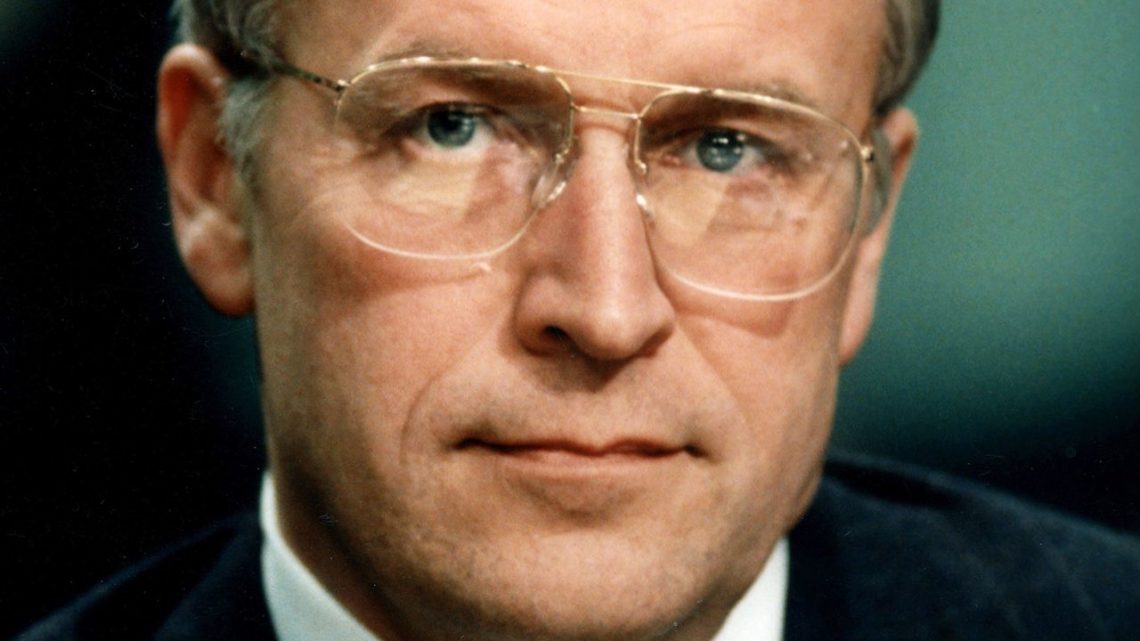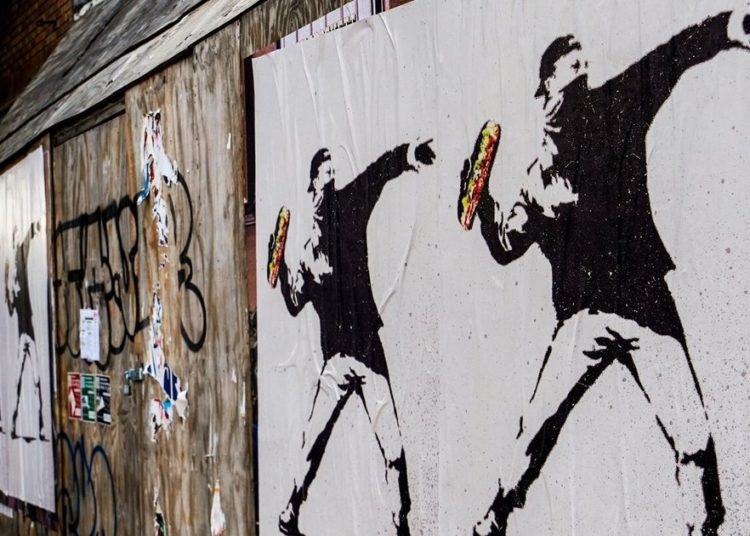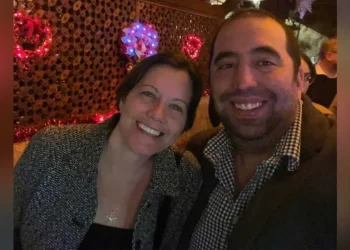Dull. That’s how some historians describe Dick Cheney, the man who spent more than 30 years in federal office, serving four Republican presidents.
Not Mike Pence dull. Or even George H.W. Bush dull (a man whom I can remember hearing women describe as reminding them of their “first husband”). No, Cheney was dull the way that men from the 1950s, the gray-suited company men of lore, were dull, and in fact he never quite shook the appearance of a relic from that decade. If, in those years, he had been an adult instead of child, growing up first in Nebraska and then in Wyoming, he could have fit in very nicely as a factotum to the Eisenhower administration. Then again, he could have fit in very nicely 30 years earlier—in the Coolidge administration.
It is remarkable, therefore, to consider that Richard Bruce Cheney, who died Monday at the age of 84 from complications of pneumonia and cardiac and vascular disease, will go down as not only the most influential vice president in American history, but as the principal architect of American power in the first years of the 21st century; that is, until the abject failures of military intervention in Afghanistan and Iraq helped set the stage for the rise of Trumpian “America First” isolationism on the right, a commensurate anti-imperialism on the left, and a diminution of America’s position in the world.
He was that pivotal a figure.
Until 2000, when he took on the role of managing presidential candidate George W. Bush’s search for a running mate—such that the process ended with Cheney, himself, as the choice—Cheney was always the guy toting around briefing binders, following the guy who was really in charge. In the Ford administration, it was Donald Rumsfeld, whose star Cheney chased.
Rumsfeld, it so happened, was one of Richard Nixon’s few confidants who was not sullied by the Watergate scandal. And upon Nixon’s resignation, Rumsfeld was called home from Europe, where he had been ambassador to NATO, to assume the role of Gerald Ford’s chief of staff. He named Cheney his deputy. Less than a year later, when Rumsfeld moved over to become Secretary of Defense, it was Cheney who succeeded him at the White House. At 34, he was the youngest chief of staff ever to serve in the West Wing.
But still, dull. Or to quote critic A.O. Scott’s description of Christian Bale’s expert performance as Cheney in the 2018 biopic Vice, a man “endowed with whatever the opposite of charisma might be.”
No great intellect, the young Dick Cheney had crashed and burned at Yale, his first college, later admitting that even his favorite class there, on the diplomatic history of the Cold War, didn’t inspire him to get anything more than a C. Back home, the son of two New Deal Democrats burnished his working-class cred by laying power lines to oil fields and communication cables to the nuclear missile sites outside Cheyenne—a poetic piece of his biography when you consider that laying “power lines” is what Dick Cheney would do for the rest of his life.
Drinking heavily, arrested twice for DUI, Cheney listened to those, including his future wife, Lynne, who urged him to look for a career path beyond the blue collar. He recovered enough academic ambition to make it through the University of Wyoming, earning a master’s, before landing a position as a junior aide to Wisconsin’s Republican governor Warren Knowles. The Cheneys, married by then, found opportunity at the University of Wisconsin, where Lynne pursued a doctorate in English, focusing on 19th century British literature. (In time, she would write books on American history, not to mention a steamy frontier novel called Sisters.)
Soon, Cheney, too, began steps toward his own doctorate—in political science. At Madison, the couple encountered a vibrant anti-Vietnam War movement which they found repugnant; the audacity of the peaceniks served to encourage their lifelong disdain for those who would challenge American exceptionalism. (It was a theme that Lynne Cheney took with her when she became the chair of the National Endowment for the Humanities in the late 1980s, and in the 1990s, when she sided with those who objected to the shift of secondary school history standards to emphasize stories of oppression over traditional stories of American achievement.)
Dick Cheney himself toyed with a professorial track, but when he asked the poly-sci mandarins if he could pause his studies to manage a congressional candidate’s campaign, the department rebuffed him. The rationale: Political scientists study politics; they don’t participate in them.
A conservative, he was no ideologue. And his political skills and instincts were rough-hewn. He failed at managing Ford’s 1976 presidential campaign. After watching Jimmy Carter move into the White House, Cheney nearly failed in his own first attempt at elective office when he ran a lackluster effort to become Wyoming’s sole Congressional representative. (The low point came when Cheney suffered his first of five heart attacks and left the campaign trail for a month, much of which he spent sitting in his backyard under a spruce tree, reading the memoirs of Richard Nixon and contemplating an end to his three-pack-a-day smoking habit.) Of course, campaigning was never Cheney’s strong suit anyway. The man whose Secret Service code name during the Ford years was “Back Seat” simply didn’t fit the profile of a guy out front.
In the House of Representatives, Cheney was a team player: first, as a reliable vote for the spend-big-on-defense, quash-regulation-and-entitlements side; later, as the chair of the Republican Conference, and then, briefly, as Minority Whip, where he pushed others to stick to the conservative agenda. You could have imagined him living out the rest of his career in that chamber, maybe rising to be GOP leader, or even Speaker, if fate hadn’t come calling in 1989 in the person of former Texas senator John Tower. Hobbled by charges of heavy drinking and sexual harassment, as well as politically questionable associations (including, it later turned out, with controversial media mogul Robert Maxwell, father of socialite and convicted sex trafficker Ghislaine), Tower, a close friend of Bush 41, couldn’t garner enough votes from his former colleagues to be confirmed as Bush’s Secretary of Defense.
To replace him, Bush needed a “safe” choice, one might even say a dull choice, that could gain quick approval. Cheney was their man. He had little experience in foreign or military affairs. In fact, as a draft-age youth in the 1960s, he had avoided Vietnam, admitting to the Washington Post in 1989, that he “had other priorities in the sixties than military service.” But he was there, and ready, and, well, there and ready.
If you want to look for the roots of Dick Cheney, the vice president, you can do no better than to examine Dick Cheney as SecDef. For it is here, in the forging of the first Gulf War—the one prompted by Iraq’s 1990 invasion of Kuwait—that you see the frustration that led to the Second Iraq War 13 years later.
To see the seedlings of Cheney as SecDef, however, you have to go back even further—to Cheney as Cold War warrior. He may not have been an ideologue while serving Nixon and Ford, but he did have a posture: humorless, suspicious, secretive, protective, and, ultimately, proactive, but always seeing the nation as caught in the grip of an existential struggle and always finding himself at odds with those who would limit executive power to engage that struggle.
To Cheney, the real dangers of the 1970s weren’t the acts of criminality and overreach epitomized by Watergate. Instead, he was alarmed by the holes that emerged in the nation’s Cold War preparedness; the weakening of intelligence agencies by the Senate’s Church Committee investigations; the limiting of presidential authority by the 1973 War Powers Resolution, by the Hughes-Ryan Act of 1974, which restricted covert actions, and by the 1978 Foreign Intelligence Surveillance Act. Even the tilt towards détente pushed by Henry Kissinger—secretary of state under both Nixon and Ford—rankled him. Cheney thought that cooperative overtures to Russia and China smacked of compromise and, along with Rumsfeld, worked behind the scenes to undermine Kissinger’s influence.
Cheney was the opposite of “détente.” He believed in a binary world, with bright lines separating America from her many enemies. Even when the Cold War ended with the collapse of the Soviet Union, he saw that as a triumph, sure, but not as an end, nor even a pause. It was, instead, an opportunity to be on the alert for new antagonists. On this thinking, history was on Cheney’s side. In the first Bush presidency, it was Paul Wolfowitz, the undersecretary for policy and a key Cheney ally, who pointed to the flaw of peacetime demobilization. Wolfowitz and Cheney joined those who saw World Wars I and II, as well as the Cold War, not as discrete events, but as battles in a longer narrative of global conflict and urged that we consider what new enemies lurked in the shadows. (“Surprise happens so often, it’s surprising that we are still surprised by it,” Wolfowitz, still delivering the same warning, told cadets in a 2001 West Point commencement address, while urging them to anticipate the “unfamiliar and unlikely.”)
Come the 1990s, the new antagonist in SecDef Cheney’s crosshairs was Iraqi despot Saddam Hussein. Cheney helped orchestrate the mobilization of forces to successfully liberate Kuwait from Iraq’s grip. And at the end of Operation Desert Storm, George H.W. Bush popularity hovered near 90 percent. But the flush of victory in which America basked during the aftermath of the Gulf War—and, more broadly, during the concurrent end of the Cold War—led to a national preference to turn inward. Just a year after invading Iraq, Bush—facing a grim recession and a country wary of another four years of the Reagan-Bush brand—lost reelection to Bill Clinton. After roughly 25 years in Republican politics, Dick Cheney was out of a job.
He took an office at the American Enterprise Institute, a conservative think tank, and, by 1996, talked about challenging Clinton himself from the top of the Republican ticket. “Obviously, I’ve worked for three presidents and watched two others up close,” he told Larry King on CNN, mistaking function for leadership. Cheney formed a campaign committee and mounted fundraisers around the pitch that America needed leaders who “do not tremble” when engaging with the rest of the world.
Predictably, the campaign went nowhere, and Cheney left the public sector for a position at the helm of Halliburton, an oil field services company based in Texas. (Halliburton famously owned Brown & Root, the company that had built much of the infrastructure for US Army bases in Vietnam—“Burn & Loot” in the anti-war movement’s lexicon—and had continued to do Pentagon business right up through Cheney’s tenure as Secretary of Defense.)
At the press conference announcing his appointment, Cheney said he was done with government, but nothing could have been further from the truth. Halliburton wanted Cheney, believing his years in Washington would help the firm acquire even more government contracts. Cheney wanted Halliburton because, in addition to the opportunity for him to profit handsomely, he remained convinced that America was at risk in the world and that partnerships with companies like Halliburton were a way the nation could prepare for it, even thrive from it. “I think it is a false dichotomy to be told that we have to choose between ‘commercial’ interests and other interests that the United States might have in a particular country or region around the world,” he told the Cato Institute in 1998. Indeed, according to the Center for Public Integrity, Halliburton, under Cheney, received “at least $3.8 billion in federal contracts and taxpayer insured loans.”
This, then, was the worldview that Cheney brought back with him to Washington after the highly contested 2000 election that put Bush 43, a foreign affairs lightweight, in the White House, and installed Vice President Cheney as Bush’s executor: a strong, unitary executive, working in secret, vigorously resisting accountability, challenging both norms and laws, and protective of American business interests, even if those interests were not exactly aligned with the interests of the rest of the world.
It is hard now—having experienced the reckless tenure of Donald Trump—to see the sins of the Bush administration. But there were many. And most had Cheney’s fingerprints on them. It is harder still to see them when one of Cheney’s final political acts—delivered indirectly through his support of his eldest daughter, House representative Liz Cheney—was to push back at Trump, a man who thoroughly detested Bush, Cheney, and the Republican establishment.
Indeed, Liz Cheney, who co-chaired the House January 6 committee, returned a measure of integrity to the Cheney name and did so despite great risk to her political future. For her troubles, she was ousted from the party leadership and, finally, from her seat in Congress. (That said, she was a classic hardline conservative. In 2013, while running for the Republican nomination to represent Wyoming in the U.S. Senate, she had refused to endorse gay marriage, even though her younger sister, Mary, a lesbian, had married her partner the year before. Dick Cheney, while supportive of both daughters, addressed the subject of marriage equality indirectly by saying “freedom means freedom for everybody” but that the question of marriage was “a tougher problem,” one that should be left to the states.)
Long before Liz Cheney became a hero to Democrats and Republican “never Trumpers,” her father was declaring principle over popularity. Consider, for instance, Cheney’s response when, in an infamous 2008 interview with Martha Raddatz, the ABC correspondent confronted him with poll numbers showing that two-thirds of the American people opposed the second war in Iraq. “So?” Cheney said. “You don’t care what the American people think?” Raddatz responded. “No,” Cheney continued. “I think you cannot be blown off course by the fluctuations in the public opinion polls.” In a similar way, both father and daughter, at the very crest of the 2024 wave of Republican “never Trumpers,” endorsed Democrat Kamala Harris, a shift that would have been unthinkable for either of them in any previous presidential election.
The attacks of September 11, 2001, and the so-called War on Terror that followed, provided the first uncomplicated moment in American warfare since the defeat of the Axis powers in World War II. And the Bush-Cheney administration seized the metaphor. In Bush’s address to Congress just days after al-Qaeda’s assault, he evoked memories of “one Sunday in 1941” and, four months later, defined a new “Axis of Evil,” referring to Iran, North Korea, and, most pointedly, Iraq.
In his 2011 memoir, In My Time, which he wrote with his daughter Liz’s assistance, Cheney describes a trip he took to London as vice president to discuss “the next phases in the War on Terror, which meant talking about the threat posed by Saddam Hussein.” While there, he visited the World War II bunker of Winston Churchill. “The modest rooms, their walls hung with yellowed maps, were a powerful reminder of Churchill’s brave leadership and the heroic fight of the Allies against Hitler,” recalled Cheney. “I remembered first reading Churchill’s account of World War II nearly forty years before, when I’d been building power lines in Wyoming during the day and reading his volumes by a Coleman lantern at night.”
The bunker, in fact, may be the perfect image for the life of Dick Cheney, who, after 9/11, had spent time in his own “undisclosed location.” He was often out of view, but he was tirelessly working the levers of control nonetheless. Indeed, during the 2004 campaign, it was Cheney who sarcastically described himself as “the evil genius who never comes out of his hole.”
A bunker is also an apt template for how he uniquely positioned American power and the surveillance state in a post-9/11 world, contending that the national security apparatus needed to reclaim the cloak of secrecy it had lost in the 1970s. “We have to work sort of the dark side, if you will,” Cheney told NBC’s Tim Russert, apropos of the threats from al-Qaeda and its supposed allies. “We’ve got to spend time in the shadows of the intelligence world.” Then he added, even more ominously, “A lot of what needs to be done here will have to be done quietly, without any discussion…”
The dark side, of course, would soon turn pitch black. The Patriot Act and the Authorization for Use of Military Force (AUMF), both of which Congress passed in 2001, were broadly drafted. Myriad executive actions followed, as did myriad abuses, from the torture of Arab detainees at a secret “black sites” to the inordinate monitoring of U.S. citizens’ email and phone communications. To Cheney, such actions were justified. “In the fight against terrorism,” he would say, “there is no middle ground, and half-measures keep you half exposed.”
Cheney was in his element. In meetings with top intelligence officials, he surprised them by asking not only what they could do within the law but what they would like to do if they could operate out on the edges of the law, governed only by Bush’s Article II authority as commander-in-chief. Over the next few years, the 2001 AUMF was invoked in Afghanistan, the Philippines, Yemen, Ethiopia, Somalia, Djibouti, Kenya and Eritrea, to cite just a handful of states, and all without a formal declaration of war. The gravest leap, however, came when Bush, Cheney, and their inner circle, working from evidence which some of them knew to be faulty, successfully pushed for a second AUMF, in 2002, this one intended to effect regime change in Iraq.
It is a testament of the degree to which Dick Cheney, and not George Bush, was driving many aspects of foreign policy in these years, that many historians associate the former vice president, and not his boss, with the abuse of power that resulted in the rendition of terrorism suspects to foreign countries; the warrantless wiretapping of Americans (a program exposed by former NSA contractor Edward Snowden); the flaunting of the Geneva Conventions in the treatment of enemy combatants at Guantanamo; the torture and abuse of detainees at the Abu Ghraib prison; the use of the euphemistically termed “enhanced interrogation techniques” that included waterboarding; and the decision to invade Iraq that would, in time, lead to the insurgency that would become ISIS.
Others among the key players in that administration have since expressed public regret for some of decisions made in fear and in haste. Cheney never did. In a 2014 appearance on NBC’s Meet the Press, he told Chuck Todd, “I’d do it again in a minute.”
It was this sort of ice-cold obstinance that was eventually Cheney’s undoing, even souring his relationship with Bush himself. In Bush’s first term, Cheney had operated like a co-president—in meetings always appropriately deferential to the commander-in-chief, but invariably the one who stayed when the others left, successfully arguing his case in private. They were a team.
As the war in Iraq played out, however, the vice president’s special brand of rigid determination started to seem manic, possessed, and in justification of excess. In his memoir, Bush reported that Cheney, impatient with diplomatic moves in advance of the invasion of Iraq, had blurted out, “Are you going to take care of this guy, or not?” But it is always harder to end a war than to start one, and when the invasion turned into quagmire, Cheney’s great fear was that Iraq would end the way that Vietnam had: with helicopters lifting off from the American embassy in shameful defeat. After the abuses at Abu Ghraib were revealed, and Bush was forced to replace his defense secretary, Donald Rumsfeld, he didn’t even consult Cheney.
Bush’s ire finally came to a head over Scooter Libby, Cheney’s chief of staff. Libby had been convicted of lying to FBI officials about his role in the leaking of the name of a CIA officer, Valerie Plame, as retribution for her husband Joseph Wilson’s public denial of a key piece of intelligence justifying the war in Iraq. Cheney wanted Libby pardoned. Cheney wanted Libby pardoned. When Bush steadfastly refused, Cheney told him, “You are leaving a good man wounded on the field of battle.”
In 2022, on the first anniversary of the January 6 insurrection, former Vice President Cheney, then 81, visited the House floor. He moved slowly, going on his tenth year with a borrowed heart, having undergone a transplant in 2012. Democrats in the chamber greeted him with surprising respect—not as a hero, mind you, nor even as a statesman, but more as a historic fixture who was not worth fighting anymore. All judgments being relative, even Cheney looked pretty good when compared to the Republicans then serving in that chamber, pretty good when measured against the man who had incited the insurrection. Cheney was there to mark the moment, support his daughter, and offer a few comments, pointing to the obvious when he stated that those who ran the GOP caucus were “not a leadership that resembles any of the folks that I knew when I was here for 10 years.”
Yet it’s worth pondering. Without Dick Cheney, would there have been a Donald Trump? Battling for the nomination against establishment Republicans, Trump branded the war in Iraq “a big, fat mistake” and said that Cheney and Bush had “lied,” a message that resonated with voters who felt betrayed by the Iraq invasion and the false claims of weapons of mass destruction that the administration had used to justify it. Those same voters felt betrayed, too, by the news that defense contractors had benefited enormously from the war, confirming a belief that the system was “rigged” toward profiteers.
From a different vantage point, one might make the case that Cheney, by pushing Bush to go where no president has gone before, showed that America’s constitutional democracy had weaknesses, ones which Trump later exploited to grotesque proportions. The Cheney era was past. But perhaps Cheney’s “dark side” assertion of executive prerogative had laid the power lines for Trump’s even darker onslaught.
After departing the House chamber on January 6, 2022, the former vice president paid a visit to the Senate side. There, walking by the office of Minority Leader Mitch McConnell, the man who did so much to define Republican governance, post-Watergate, encountered a white marble bust of himself mounted on a stone pedestal. It had been unveiled back in 2015. A reporter asked him if it was odd to see his likeness in a posture of such permanence. “A little bit,” he replied, with evident false modesty, and then went on his way.
The post Dick Cheney Is Dead At 84 appeared first on Vanity Fair.




